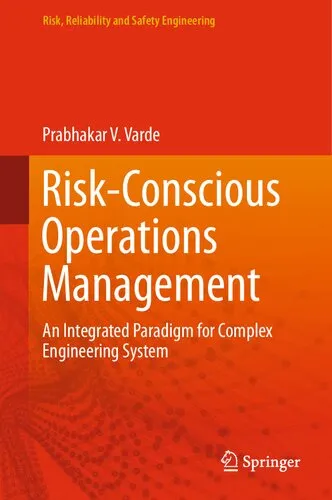Risk-Conscious Operations Management: An Integrated Paradigm for Complex Engineering System
4.8
Reviews from our users

You Can Ask your questions from this book's AI after Login
Each download or ask from book AI costs 2 points. To earn more free points, please visit the Points Guide Page and complete some valuable actions.Introduction to Risk-Conscious Operations Management
The landscape of modern engineering systems is becoming increasingly complex and dynamic, demanding not only technical proficiency but also strategic foresight in managing risks. "Risk-Conscious Operations Management: An Integrated Paradigm for Complex Engineering System" is a definitive exploration into the methodologies, principles, and strategies required for managing the uncertainty and risks inherent in high-stakes engineering operations. This book serves as an indispensable guide for professionals, researchers, and students aiming to navigate the multifaceted challenges that accompany advanced engineering systems.
This comprehensive book outlines an integrated, multidisciplinary approach to risk-conscious operations, blending the principles of systems engineering, risk management, and operational optimization. By adopting this paradigm, organizations can enhance their resilience, improve decision-making, and achieve sustainable performance in engineering domains ranging from aerospace to energy, healthcare, manufacturing, and beyond.
In the chapters that follow, this book delves deep into the foundational aspects of risk assessment, the interplay between human factors and engineering systems, and the application of advanced analytics. What sets this book apart is its emphasis on integrating traditional risk management frameworks with emerging technologies and operational strategies to deliver a truly holistic approach.
Detailed Summary of the Book
This book is structured to bring clarity to the multidimensional challenges in operations management and establish a coherent framework for risk-conscious thinking.
It begins by laying a strong foundation in risk principles, explaining concepts such as uncertainty quantification, probabilistic modeling, and failure analysis. Building upon these fundamentals, the book explores tools and techniques to identify threats, assess vulnerabilities, and mitigate risks in complex engineering systems. Special focus is given to systems with high levels of interconnectivity and dependency, where cascading failures and unforeseen scenarios are common.
A core theme that runs throughout the book is the integration of human factors in engineering decision-making. Contrary to traditional approaches that treat human involvement as a source of errors, this book recognizes the critical role that human operators play in system resilience and adaptability. By blending data-driven insights with experiential knowledge, the book advocates for creating systems that are both human-centered and technologically robust.
The latter sections of the book emphasize the application of emerging technologies, such as artificial intelligence, machine learning, and digital twins, to improve risk management. Case studies from diverse industries illustrate the practical implementation of principles discussed, providing readers with actionable insights.
Key Takeaways
- A comprehensive understanding of the risk-conscious paradigm and its significance for complex engineering operations.
- Practical tools for uncertainty analysis, fault tree modeling, and system reliability evaluation.
- Guidelines for integrating human-centric decision-making and technological advancements into risk assessments.
- Real-world applications from industries like aerospace, manufacturing, and energy to contextualize theoretical concepts.
- Future perspectives on leveraging data analytics, AI, and predictive modeling for transformative risk management.
Famous Quotes from the Book
"In a world dominated by complex systems, risk is not merely an obstacle to success—it is an inevitable aspect of progress that demands deliberate and conscious management."
"The convergence of human intuition and machine intelligence represents the pinnacle of effective risk-conscious operations management."
"To manage complexity is not to eliminate risk entirely, but to build systems that thrive in the presence of uncertainty."
Why This Book Matters
"Risk-Conscious Operations Management: An Integrated Paradigm for Complex Engineering System" is more than just a guide; it is a revolutionary framework that addresses the core challenges faced by engineers and managers in the modern world.
In today’s rapidly evolving technological landscape, engineering systems must deal with uncertainties that arise from interconnected global supply chains, fluctuating operational environments, and disruptive new technologies. This book provides an essential toolkit for understanding and mitigating these risks, empowering organizations to build resilient and reliable systems.
What truly makes this book a must-read is its ability to resonate across multiple domains. Whether you are an engineer designing critical infrastructure, a researcher exploring risk analytics, or a decision-maker overseeing complex projects, the book offers insights and practices that are universally applicable. Furthermore, by emphasizing a collaborative and integrated approach to risk-conscious management, it aligns with the global movement toward sustainability and long-term optimization.
Simply put, this book bridges the gap between theoretical risk management models and practical applications, ensuring relevance for both academia and industry. It is a timely resource for anyone who strives to excel in the increasingly complex engineering ecosystem.
Free Direct Download
Get Free Access to Download this and other Thousands of Books (Join Now)
For read this book you need PDF Reader Software like Foxit Reader


